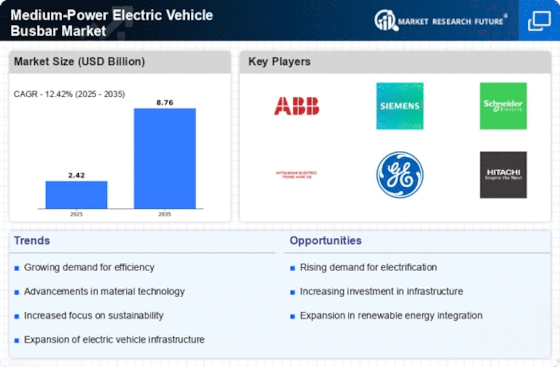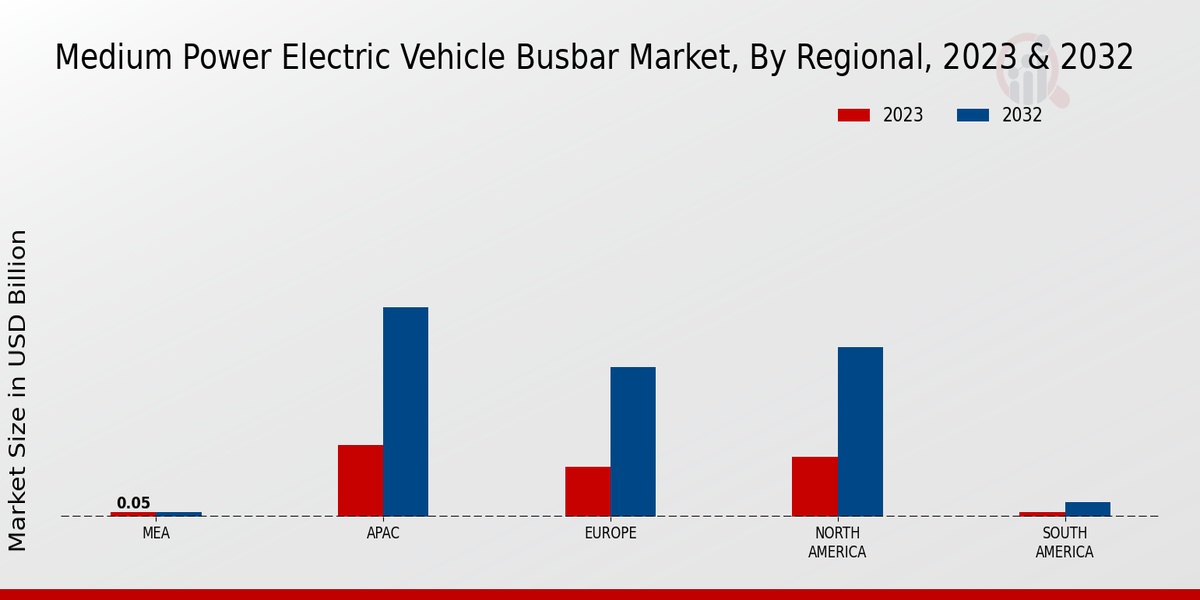Rising Environmental Concerns
The growing awareness of environmental issues is propelling the Global Medium-Power Electric Vehicle Busbar Market Industry forward. As climate change and pollution become increasingly pressing concerns, consumers and businesses alike are seeking sustainable alternatives to traditional fossil fuel-powered vehicles. This shift towards greener transportation solutions is driving the demand for electric vehicles, which in turn necessitates efficient power distribution systems like busbars. The market's expansion is further supported by the global commitment to reducing carbon emissions, with projections indicating a market growth from 2.2 USD Billion in 2024 to 7.81 USD Billion by 2035, highlighting the critical role of busbars in achieving sustainability goals.
Government Incentives and Policies
Government initiatives aimed at promoting electric mobility are significantly influencing the Global Medium-Power Electric Vehicle Busbar Market Industry. Various countries are implementing financial incentives, such as tax rebates and subsidies, to encourage the adoption of electric vehicles. These policies not only stimulate consumer interest but also incentivize manufacturers to invest in the development of efficient busbar systems. As a result, the market is expected to witness substantial growth, with projections indicating a rise from 2.2 USD Billion in 2024 to 7.81 USD Billion by 2035. Such supportive regulatory frameworks are essential for fostering innovation and expanding the market for medium-power busbars.
Expansion of Charging Infrastructure
The expansion of electric vehicle charging infrastructure is a crucial factor influencing the Global Medium-Power Electric Vehicle Busbar Market Industry. As more charging stations are established globally, the demand for efficient power distribution systems, including busbars, is expected to rise. This infrastructure development not only supports the growing number of electric vehicles on the road but also enhances consumer confidence in EV adoption. With projections indicating a market growth from 2.2 USD Billion in 2024 to 7.81 USD Billion by 2035, the need for reliable and efficient busbar systems becomes increasingly apparent. The synergy between charging infrastructure and busbar technology is essential for facilitating the transition to electric mobility.
Growing Demand for Electric Vehicles
The increasing global demand for electric vehicles (EVs) is a pivotal driver for the Global Medium-Power Electric Vehicle Busbar Market Industry. As governments worldwide implement stringent emissions regulations and promote sustainable transportation, the adoption of EVs is expected to rise significantly. In 2024, the market is projected to reach 2.2 USD Billion, reflecting the growing interest in electric mobility. This trend is likely to continue, with the market anticipated to expand to 7.81 USD Billion by 2035, indicating a robust compound annual growth rate (CAGR) of 12.21% from 2025 to 2035. Such growth underscores the critical role of busbars in facilitating efficient power distribution in EVs.
Technological Advancements in Busbar Design
Innovations in busbar technology are driving the evolution of the Global Medium-Power Electric Vehicle Busbar Market Industry. Enhanced designs that focus on weight reduction, improved thermal management, and increased conductivity are becoming increasingly prevalent. These advancements not only optimize the performance of electric vehicles but also contribute to overall energy efficiency. For instance, the integration of lightweight materials and advanced manufacturing techniques can lead to significant reductions in energy losses during power distribution. As manufacturers strive to meet the growing demands of the EV market, these technological improvements are likely to play a crucial role in shaping the future landscape of busbar applications.




















Leave a Comment